Insert your values and your priorities into your day to day life, and even in the smallest of ways that will be hope giving and doable.
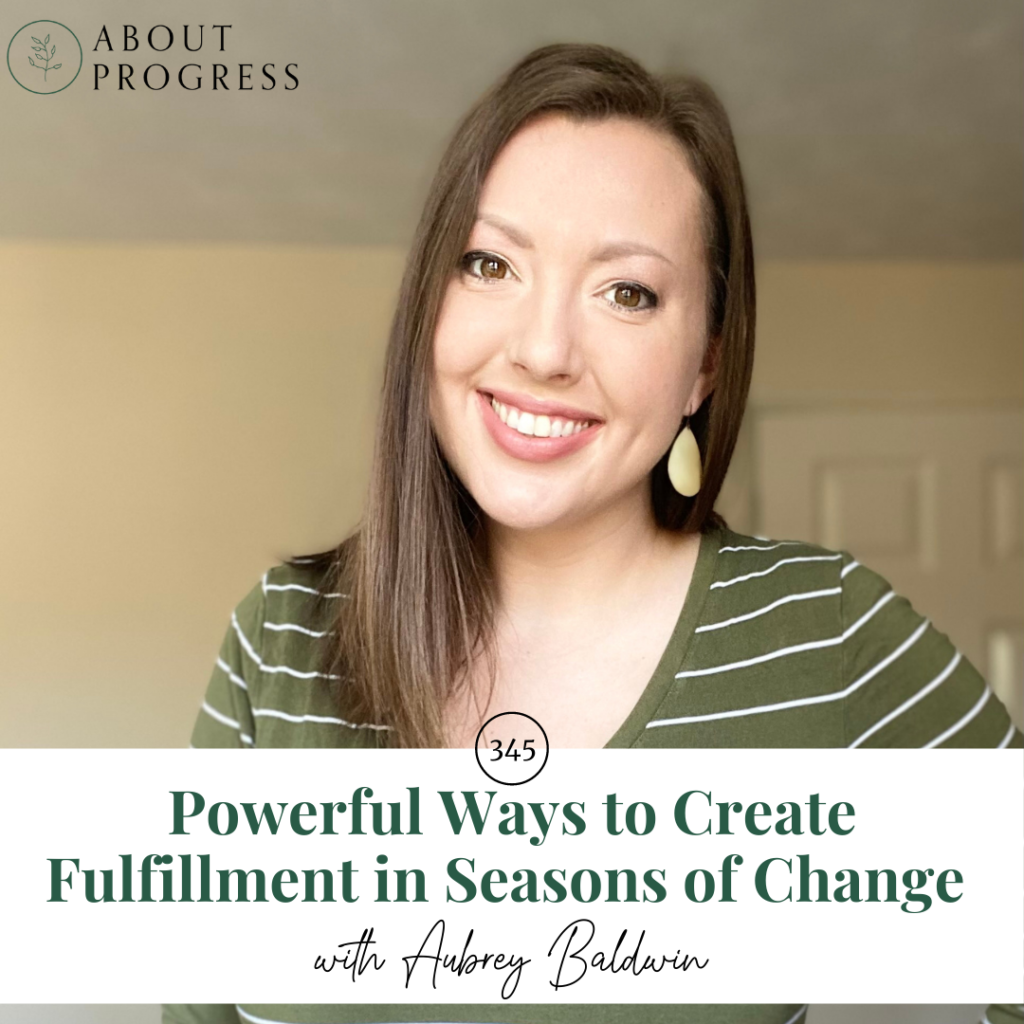
Whether you asked for it or not, at some point or another you will find yourself in a season of change. Women in this community who have been through that have expressed feeling overwhelmed and unsure of navigating their new paths. Sometimes this applies even when you have chosen your season of change. Here we are focused on personal fulfillment, feeling whole, and like yourself amidst the ebbs and flows of your life. Tune in for this interview with a fellow progressor who is well versed in this scenario and shares powerful ways to create fulfillment in seasons of change.
Aubrey Baldwin is a mother and Air Force wife living abroad in England, so she is no stranger to frequent moves that take her far from family and familiarity. She shares her personal story of how she realized that a simple routine, gratitude, and connection could create fulfillment even in seasons of change. Life is never static, and while the transitions can be out of our control, we can find peace and alignment when we learn how to prioritize and control the controllables.
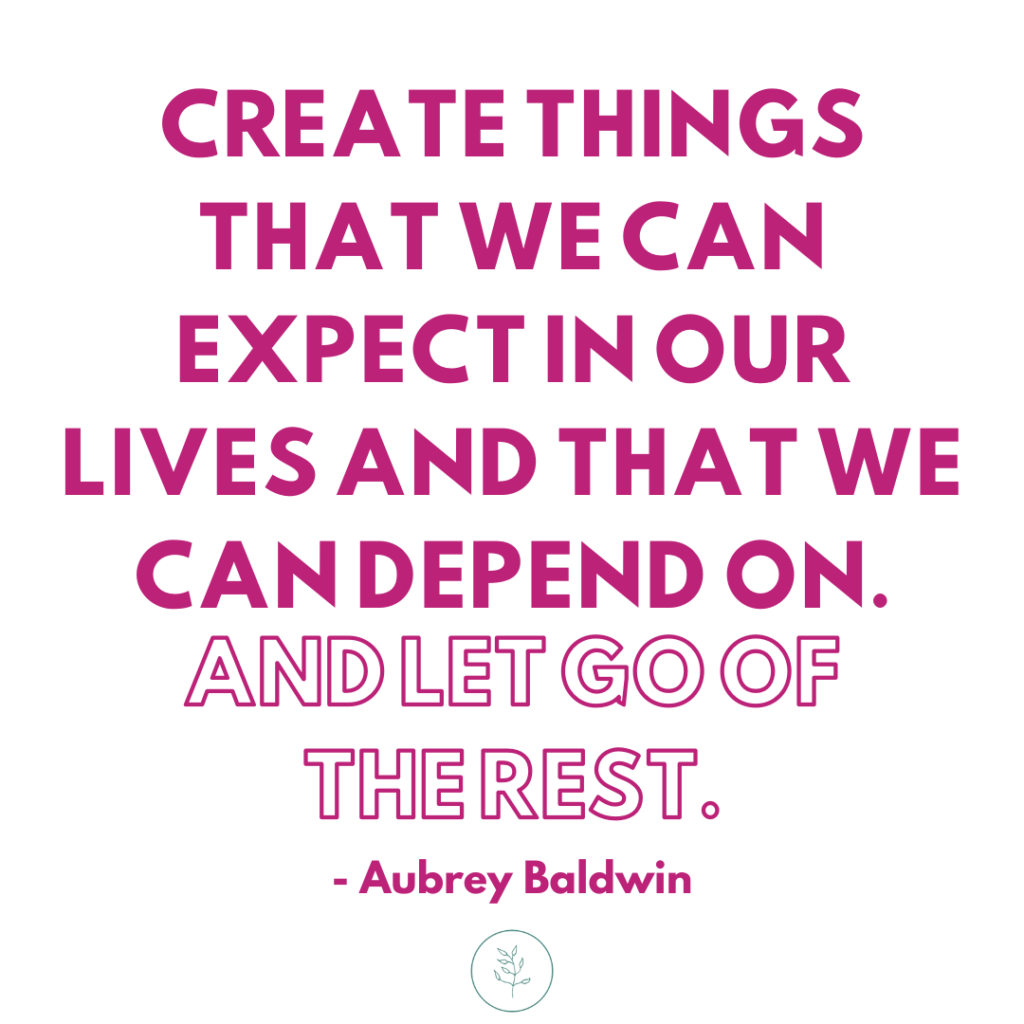
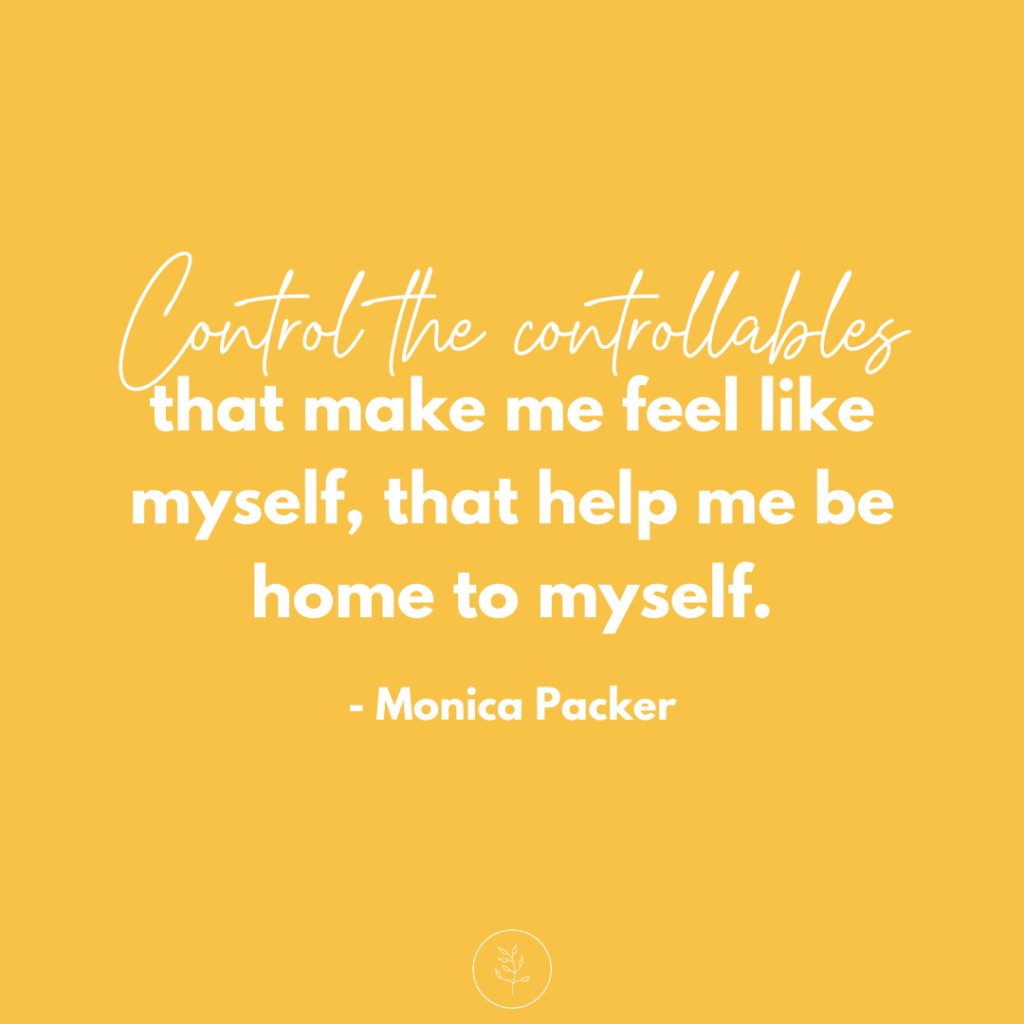
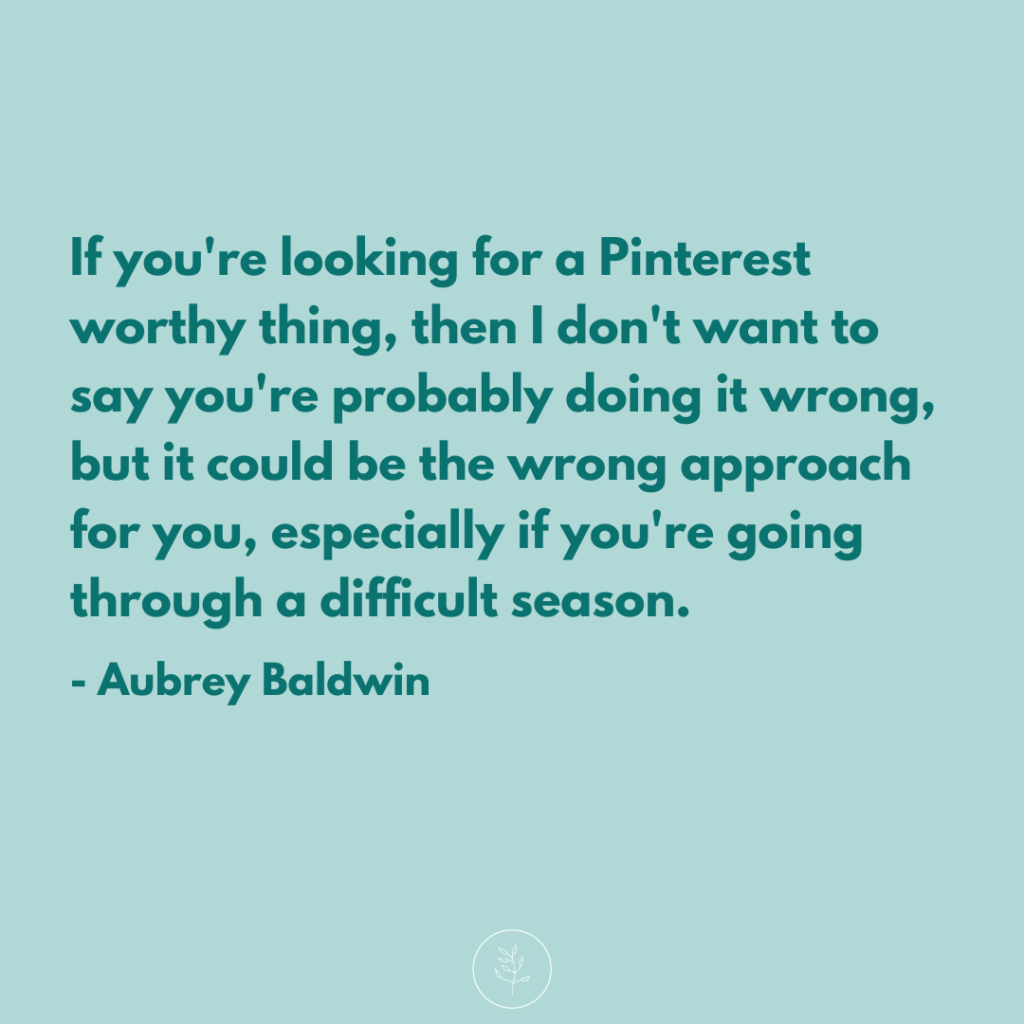
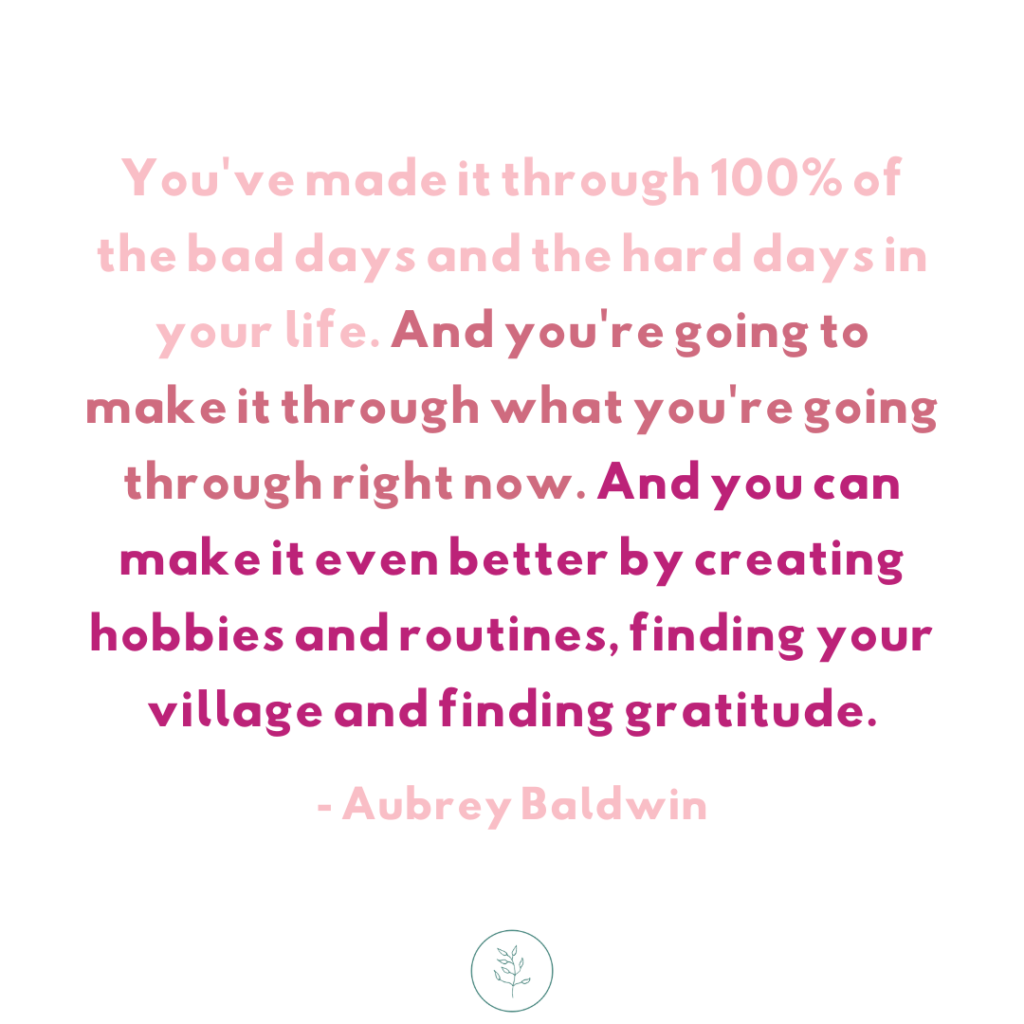
About a few other things…
Reclaim your creative power and rediscover who you actually are! If you’re ready to come back home to yourself, to be able to say that you know who you are and what matters to you, take my foundation course, “Finding Me.” It’s OK that you’ve lost parts of yourself along the way; but as you learn to anchor back into who you are and align your life to what matters to you, you’ll find that you have more strength, more fulfilment, and more creativity to bring to your important roles and responsibilities.
I have a goal to get to 1000 reviews, and I need your help! If you would leave a rating and simple review on Apple Podcast it would really help the show grow, and reach even more women who need this community. I appreciate each one, as well as your shares, it helps me keep the show going and know better how to serve you!
Sign up for the Go Getter Newsletter to get Progress Pointers in your inbox every Thursday.
You can listen the episode below, or on Apple Podcasts/iTunes, Spotify, Youtube, Overcast, Stitcher, Pocketcasts, or search for “About Progress” wherever you get your podcasts. If you like the show please share it, subscribe, and leave a review!!
SHOW NOTES
Aubrey’s Instagram, Website, “I Belong, Too”
Leave a rating and review for the podcast!
Miss Kelsey Preschool and Kindergarten Boxes – 20% off with code ABOUTPROGRESS
Foundational course, “Finding Me.”
Free and easy Belonging Guide
Get on the waitlist for the Strive Hive, my monthly membership group
Lend your voice and experience + be featured on the show HERE
Join Monica on Facebook and Instagram
Songs Credit: DRIVE by Dj Nicolai Heidlas @nicolai-heidlas Music provided by FREE MUSIC FOR VLOGS AND VIDEOS bit.ly/freemusicforvlogs
TRANSCRIPT
Monica: [00:00:00] Aubrey Baldwin, we are so excited to have you on About Progress. Thank you so much for being here.
Aubrey: [00:00:05] Thank you, Monica. It is a privilege to be here.
Monica: [00:00:08] These are always my favorite interviews because, my goodness, we have the most intelligent, amazing community. And I learn so much not only from what we do on Instagram together, but especially these interviews. And today we’re get to hear a little bit of your story and how we can create the filament, which is kind of a different take on our theme this month about creativity.
I love that this is so applicable because we don’t often think of it that way that we have that power. So let’s just start a little bit with your own story about where you are as a family right now, and how you’ve had to learn that you even have the option to create your own fulfillment.
Aubrey: [00:00:46] So, My husband is an air force pilot. And I never thought that I would marry anybody in the military. But my family lives in Colorado Springs. That’s where my parents are at. And we ended up meeting and I just felt like, okay, like I’m doing this, you know, I’m going to be a military wife. And we ended up moving down to Texas for pilot training.
And since we’ve been married, we’ve been married almost five years and we are about to have our sixth move.
Monica: [00:01:13] And so, so six months, five years.
Aubrey: [00:01:17] Yes. And so it’s just been this crazy ride of. Figuring out how to be fulfilled in many different places, with different people with my life, looking very different than what I thought, which I think all of us feel that way at one point or another, right?
Like, wow, this is very different than what I pictured my life to be. But I have felt that particularly in this military lifestyle that I knew nothing about beforehand. And so, yeah, we’ve just moved from place to place to place. And I’ve really, I feel like fine tuned kind of my ability to find my village, wherever we go and create a routine that works for us.
And it’s just been really fulfilling. And it’s so helpful to me to know that I can be truly happy and fulfilled no matter where we live.
Monica: [00:02:08] I think this is especially poignant because you’re talking about how. You can face an unexpected season. And we all go through that. Whether or not we’re moving because we’re in the military, like you, or just life happens.
And suddenly you’re in a new season that you didn’t expect or ask for. And I’m sure you see a lot as a military family, people who are waiting to find fulfillment and happiness, maybe until the next move or until the moving stops or to a better apartment or whatever it might be. And how have you just seen that in action?
And how have you been able to move past that yourself?
Aubrey: [00:02:45] Right. So a lot of spouses, I know it’s, it’s interesting to see the differences between how we handle this. Like you said, and there definitely are spouses who just kind of sit in their house and don’t really go out and explore the area and they don’t, and this isn’t to shame them.
These are just my observations that these spouses are, kind of, yeah, like you said, just waiting for life to happen and waiting for it to be a perfect scenario, right. Where they live close to home, they’re able to have their career, their children are in school. And if I’m being honest, I struggle with that as well.
Sometimes who doesn’t think I can’t wait until my kids are all in school or until they’re grown? So this does not, like you said, this does not just apply to military families. These are things that we all deal with, but I think. You know, for myself, just learning to expect that those perfect scenarios may never happen, or they might not happen in the time that I want them to has been helpful.
So for example, I would love to work, but that’s hard when I’m moving around every couple of years, it’s hard to start up a job and then leave it. And so in my experience, it’s like, well, How can I find fulfillment in other ways or work in a different way than I had originally anticipated working instead of just sitting on the sidelines and waiting for that perfect day when my kids are grown and my husband’s out of the military and I can finally have my career.
And so I think that applies, like you said to people within the military and without, I just see a lot of spouses get stuck on that. Like they feel stuck because they can’t have the career they want on the timeline they want.
Monica: [00:04:32] And like you said, this applies to all of us and maybe we can ask the listeners, you know, think about how life is never static and how we transition from one season to the next, without our permission, or also without us even realizing it’s happening until we’re in the middle of it. And I think what we’re talking about today is fulfillment’s come up a lot. But when we’re saying fulfillment, we’re talking about emotions that you want to feel experiences. You want to have the person you want to be, and we can’t wait. We can’t continue to wait and wait and wait. We have to create the fulfillment here and now. So because you have been through this so much, let’s dig into some of the advice that you have on how the people who are listening.
Can do this regardless of what their season is and how it’s playing out for them, how they can create the emotions, the abundance, the fulfillment, the happiness that they want, even with the shifting circumstances they’re facing.
Aubrey: [00:05:33] So one of my very favorite quotes is by John Lund. And he said that all frustration is based on unmet expectations.
Monica: [00:05:41] Oh yes, that’s good.
Aubrey: [00:05:44] So, if you think about that quote, in terms of, in our life, when we have certain expectations and they’re not met, we S we can spiral down really easily, really fast and to despair and anxiety. So, in my opinion, one of the best things that we can do is to create things that we can expect in our lives and that we can depend on.
And let go of the rest. And not let go in a sense, like you’re giving up on the things that you want, but just kind of that serenity prayer, right? I like, I accept the things that I cannot change and I pray for courage to change the things I can. That’s not exactly how it goes, but so in my life I have created things that I can expect every day, no matter where we live.
And one of those is to either get outside or go on a drive, just get out of the house. That is something that for me personally brings fulfillment. We currently live in England. It’s really rainy and it’s hard, but we still do it. We’ve also lived in Texas where it’s really hot, but we still do it. We get out on a walk or we go to the park, we go to the store, we just get out of the house.
That’s something I have created that we can expect in our daily routine. And it just gives me a lot of peace of mind.
Monica: [00:07:05] The thing that I am connecting with, we’ve talked about this in the About Progress community. This comes from my optimized coaching program that I’m certified with as we call this control controllables.
There’s so much we can’t control. We can’t control people, the weather where we live, sometimes the money, the food, like things like that, but there are things that we can control and this isn’t meant to be about toxic positivity. This is still getting back to what can I create? That makes me feel like myself, that I, that I know that I can’t own, that helps me be myself home to myself.
And I love that you had that example of being outside because that is totally me too.
Aubrey: [00:07:43] Right? Well, and that’s something that, that we can carry with us no matter where we live. And it might look different in each place. Like I said, you know, in. Texas we’re going swimming. And here there’s not really outdoor swimming pools because it doesn’t even get warm enough most of the year for that.
But we do still, like I said, go on walks in the forest and such. So that’s been really helpful and that’s going to look different for everybody, but. But to control the controllables and to create those things that you can expect is just in my opinion, vital, especially during times of transition. Right now we have this unexpected issue we’re dealing with in our house and we’ve had to move bedrooms and we’ve had to just take all the clothes out of the wardrobe.
Well, we don’t have closets here. We have wardrobes. Yeah. Anyways. And so I just, I have found myself thinking I’ll be happy when this is just over. You know, I can get back to my routine when this is over. And in a sense that’s kind of true because right now I’m pulling clothes out of a box to get dressed.
So my routine is messed up, right? It is not the same that it always is, but there are things that I can still control and there are things that I can still do to help me feel like myself. So. That’s I think a lot of us go through issues like that, where we’re in the middle of a move or we’re painting a room, whatever it is.
And to start our life feels a little bit chaotic to create those things you can control.
Monica: [00:09:09] Right. It really can be the basics. You know, I, I had an amazing guest on a few years ago, her name’s Natalie Norton, we talked about how to get out of a funk and she. So really even when she was at the height of deep, deep depressions or just, you know, a general life is hard this week.
And, you know, we all go on across that spectrum there. She said the number one thing for her was to always take care of her own hygiene. Like even on the worst day, she could just get in the shower and make sure she put on clean sweats. You know, something like that. It can be as basic as that, or it can be as fulfilling is what makes me feel like myself. So that’s a fantastic advice. What else would you say to them?
Aubrey: [00:09:50] I would say to find a group of people or at least one person to support you through your transitions. So a lot of people think when you talk about a village, that it means a big group of people. And I would argue that a village can be as big or as small as you want or need it to be. I would suggest if, if making friends is difficult for you, then just start with one person, start with reaching out to one person, whether it be a family member or a friend that can support you through times of transition.
And I’ve obviously had to get pretty good at this. If I want to feel fulfilled in having a village, because we haven’t lived near family for like four years now. And right now we live across the world. And so when my babies are born, it’s other people that are taking care of my kids and things like that, you know, and that’s been hard, but with time it gets easier.
There was this one day where my daughter, she fell off of a chair and she hit her chin just right, that it split open. So we had to go to the ER and my husband’s like up flying across Iceland. Right. He sees nowhere near. Yeah. And so I had to call a friend, but it was so nice to know that. I just, I just had that person that I didn’t even have to sit there and think, who am I going to call?
You know, it just, okay, I have this friend I’m going to call her. She’s going to come stay with my baby while I take my toddler to the hospital and having that security of knowing I have at least one person I can count on in times of difficulty or transition or whatever that is super incredible to have.
So that’s another thing that I would suggest is to have find it, find your village. Yeah.
Monica: [00:11:42] And, you know we’re, we’re about to go through a transition similar. We don’t have to do this every year, like you’ve had to, but my, my son is just joined a baseball team full of kids he doesn’t know cause we’ve moved, you know out of state and we told him.
The other day, my husband was trying to tell him, you know, all we want you to do is make friends here. And, I tried to have my own stance on that and to say, actually, I think it’s more be a good friend. Like just be a friend for people. How has that played out for you instead of . . . I think it’s good to find friends for sure. But to me it’s more of that mindset shift of being a good friend, being a village for other people is often how you find yours. Is that been true for you?
Aubrey: [00:12:25] Absolutely. I that’s a really great point because the friends that I have found are often, like you said, it’s through, you know, whether I just go up and introduce myself. I mean, that is in my mind being a good friend, right. Getting to know them, asking questions about them. And a lot of times that is reciprocated. And then as the friendship grows, you can be a good friend by, you know, supporting them. In, you know, it doesn’t have to be bringing a meal.
It can be, but it can be things like just sending them a message and saying, Hey, I was thinking about you today. Or do you want to meet up and go on a walk or meet up for a play date, things like that. And then I think as you continue, you can really get to kind of the. I want to say the meat and potatoes, where you can really talk to me. I don’t really love small talk that much. I want to talk about the things that really matter. To people, I want to help them through their heartaches and through the unexpected things that happen in their lives.
And so that’s how I would say, you know, you can start small, but the ultimate goal would hopefully be to build to that level of vulnerability and trust. And you don’t have to have that with every single person. But like I said, if you can have at least one, one person that you can be vulnerable with that I think is great.
Monica: [00:13:54] And it definitely goes back to our theme of, you know, creativity. You’ve got to get creative about what that’s going to look like. I know I’m going to be personally hosting a lot of dessert nights at my house once we’re finally in. Yes. So this is so helpful. What else would you say for them? I like literally taking so many notes because I’m going through a transition too.
Aubrey: [00:14:13] So tell us next, what you have in mind. So find your, your habits and your routines. We’ve talked about this a little bit, but with how I get outside with my kids, but I want to tell you a few things I have created in my days that I can expect and that I can control. So I can expect to take three deep breaths when I wake up.
Right. These are all personal to me, but, but maybe there’ll be an idea. Yeah out there that somebody will will like. And it can be as simple as I can light a candle each day, I can turn on music or read a book. I can make my bed. We can have a 20 minute cleanup after dinner as a family, or spend time outside.
I can have a date night with my husband each week. These are things that I can do no matter where we live, no matter what, we’re almost no matter what we’re going through in life. Each night I write in a gratitude journal, I try and move my body each day in a way that feels good, whether that’s yoga or walking or a more intense hit workout.
Also, you talked about being a friend. One thing that I try and do almost every day is to send a message to a friend. So I can’t necessarily expect an answer because you know, people are going to respond when it works for them, but I can expect to send it that’s what’s in my control. And I, I often find myself thinking if I get in that kind of like a victim stance, I think nobody’s messaging me and nobody cares about me then I think to myself, well, have I messaged anyone recently?
And I take that opportunity to send a message to somebody that I’m thinking of.
Monica: [00:15:51] Everything you described. I love, especially about it, it’s not the kind that you see on a Pinterest board, right? Like these are really life giving and grounding routines and habits, but they’re not like have the perfect meal plan, like make sure like host these huge events.
Like you said, it’s, it’s the small ways that you can care for yourself and that you can insert your values in your priorities and what matters to you into your day to day life and the smallest of ways that to me is even more hope giving and doable, then the big Pinterest worthy things that we can see.
Aubrey: [00:16:27] Absolutely. I think that, you know, if you’re, if you’re looking for a Pinterest worthy thing, then I don’t want to say you’re probably doing it wrong, but, but it could be the wrong approach for you, especially if you’re going through a difficult season and. You know, I, I started training for a half marathon. But I, I was pregnant with my second, but I didn’t know that I was so I kept running for as long as I could, even after I knew I was pregnant, but then you just get to a point where at least for me, I like, I just can’t be running six miles a day anymore.
And I would just have to tell myself: times and seasons, there are times and seasons for things, and this is not the season to train for a half marathon and that’s okay. I can create fulfillment and happiness in my life. In other ways, it doesn’t have to be like that goal. You know, if I enjoy moving my body, it can totally be something else.
And just having that mindset shift is so important
Monica: [00:17:29] And, and it helps you part of this creativity is being willing to be flexible and to see other options and other ways to find, I mean, that release is so awesome. Like there’s nothing better than that. Great hard run to get out of there and stuff, but can’t do that all the time.
So there needs to be another way. And you’re just giving us permission to figure that out. I love that. Okay. Aubrey, what else would you say to them?
Aubrey: [00:17:55] The biggest thing, and it sounds really, you know, kind of like, Oh, I hear this everywhere. It’s so cliche, but it’s find your gratitude when you look for the good and when you focus on it, the good gets better.
I’m not sure who says that, but I know that Ralphie from Simply on Purpose, she quotes that very often and it’s just impacted my life.
So this quote is by John Piper and he says occasionally weep deeply over the life that you hoped it would be grieve the losses, feel the pain, then wash your face and embrace the life that God has given you. That’s perfect. So I, I think that this quote is meant to be insensitive to our grief.
It’s okay. And necessary to weep and grieve the losses of your life. That that’s not what gratitude, gratitude is not being dismissive. Like you said, that toxic positivity, it’s not being dismissive of the loss that you’ve experienced. There is, you know, even in my very blessed life, I have grieved the loss of many things. We have, you know, we moved over here to Europe, hoping to be able to travel for three years and then COVID hit.
That is something that it’s okay for me to grieve that it’s okay for me to grieve my body changing and the loss of friends or how I had to end up finishing my degree online instead of in person, because I’m married to a military man and we move, you know, there’s things that I think it’s okay to grieve those.
It’s just that you can’t stay in that space of mourning. Permanently, or at least not in the same way. Right. You have to kind of let the waves come and go. And in a moment where you do feel strong enough to do something, then do something. And that’s what I feel being grateful is, is creating that sense of happiness and kind of that fire inside and just running with it.
When you feel like you can in the seasons, you feel like you can.
Monica: [00:20:00] It’s the noticing, right? Again, and this is going back to many things we’ve said throughout this interview, you’ve said actually is the small things. It’s just the noticing, the small moments of something good. Even when you feel normal. I remember after quite a long time of feeling, very, very severely depressed and not like myself at all. Just having one moment. And I was like sitting in church and I had a moment where I was like, I feel normal right now. Like, I feel like myself and that felt like a miracle. It can be a small and as simple as that. The, you know, the sunshine on my face. It doesn’t have to be big. It doesn’t have to be grandiose. It doesn’t have to be like Oprah worthy, you know, where everyone’s going to cheer. It’s just noticing those small moments.
Aubrey: [00:20:49] Yeah. And you know, a lot of people write in a gratitude journal and that has been something I have started this year and my habit is to write one sentence. After I turned down the covers and my bed to go to sleep at night, I write one sentence in my gratitude journal. It’s simple and it’s easy. And even if it was an awful day, I can still think of one thing. Like I’m grateful that my children finally stopped screaming and went to bed, or I’m grateful that I could light a candle to the day and just breathe that sentence or, you know, whatever it is.
Like you said, the sun on your face, especially here in England is huge. If the sun comes out, it’s like, yes,
Monica: [00:21:31] One summer, I lived in London for study abroad. And it always cracked me up because you know how the weather is really temperamental, obviously there, but the days where it was sunny, it was like all the fancy British men were walking around Hyde park with their shirt off. And it amazed me, but now I’m like, they were just being present in the moment that they finally got some sunshine on their very sun- avoidance skin and it felt good, you know, so we can look for those moments. You can be present and, you know, Aubrey, I know you have another final pointer for us. What is that?
Aubrey: [00:22:07] So that would be to find some creative outlets and hobbies. And these, these can go with like your routine and your habits.
But oftentimes I think that they’re, they’re not as connected as we think that an outlet or a hobby, it may not be something that you can do every single day, but it’s something that just helps you feel like you, like you mentioned before. And so I’ll tell you one of mine. One of my favorite outlets is to just sit in a bath and like, just be there, right. And read a book and kind of do the whole thing with a candle if I can and just soak there. So that’s an outlet of mine, but, but it’s not necessarily a hobby. So a hobby would be, I like to play the piano and it’s not something that I’ve worked into my everyday routine, but it’s something that brings me a lot of joy when I can do it. And when I feel like I have the energy to do so, but just finding those things as well, that’s going to really help you feel like special in a sense that it’s going to help you feel like I have something this belongs to me, I can do it. And it helps me feel like life is good. That’s that makes sense.
Monica: [00:23:18] Absolutely. It all comes back to at the end, we had earlier this year, be wholehearted. It’s about belonging to yourself. It’s like feeling like you have some ownership in your life to just step into your body and to embody who you really are for even a few minutes. That’s how I play the piano is for me too.
I wonder if we’re like the same person, but just living alternative lives here, but across the world. Yeah. Across the world too, you know, I think it would just be so fun to hear another story from how this has all been wrapped up in a nice bow, I guess, for you a way that any of these any of these tips you gave us today were ways for you to come home to yourself. Like we just talked about.
Aubrey: [00:23:58] Yeah. When we were first married, we lived just 15 minutes from my parents’ house in Colorado. And that was so fun because we got to go there every week for dinner. And, you know, just to know that they were close, but after eight months we moved down to a tiny town on the Texas Mexico border.
And that’s where my husband did pilot training. And so this was like, In my married life, the first big transition that I had ever gone through. And I remember just driving away from my parents’ house, just big tears, streaming down my face. And what hit me was this wasn’t the first time that I’d been away from home.
I mean, I had gone to school in another state and I had done a year and a half in Brazil serving a mission for our church and living away from home was not new to me; but what was new to me was living so far away and not knowing what my purpose was because I had never done this role of like the military wife. And so before the roles had always been student or missionary and this time it was like, well, I’m a military wife, but what does that even mean?
And how can I be happy in this because I don’t even know what to do or how to do it. So to top all of those off I was actually pregnant when we moved down there and I didn’t know. And I just had this debilitating nausea. So here I am. I know absolutely no one, it was so hot outside. We lived two and a half hours from San Antonio, which was where the furthest airport was.
Or the closest airport, I should say, closest target. I was throwing up sometimes 10 times a day, all alone in my house. My husband worked 12 hour days, and he had no service in his building. So I just felt completely isolated. And those were really dark days. And I remember one day he came home, he walked through the door and I just burst into tears.
And I said, I feel such a sense of relief when you come home, because then I’m not alone anymore. I just, the way that this relates, I guess, is because I, I got to this point where I just thought I cannot live like this anymore. I can’t, I have to do something. So I got on some medicine and luckily the nausea let up and I was able to, to create some things.
So here’s here’s some of the things that I did: I went into town by myself. And I went to go check out like this little bakery nearby. Or I would go to the Lake or we would try local restaurants. I started teaching piano lessons, actually, that was something that really helped me. And I continued my online classes, which I didn’t love, but I was determined to finish because that was a goal of mine was getting a degree.
And so that brought a sense of purpose into my life. And then we also did projects like finishing a crib for our, for our little girl and, you know, just things like that. I joined a book club. I studied with my husband. We took trips. And I guess all of this is to say that that was my first big experience of creating happiness and kind of controlling the controllables in an experience that was honestly one of the hardest years of my life.
And my husband’s life as well, because pilot training was, was no piece of cake, but that experience has been foundational for me because I know that no matter what I go through in the future, I’m like I made it through this and we, we thrived in the end and we actually were sad to say goodbye. And so that actually, if I can add one more thing to the, the advice is just everybody has these foundational experiences. And when you’re going through something hard or a big transition, one thing that you can do is look back on an experience that you made it and that you really, even if you didn’t feel like it at the time that you were thriving, you still made it through.
You’ve made it through 100% of the bad days and the hard days in your life. And you’re going to make it through what you’re going through right now. And you can make it even better by creating hobbies and routines, finding your village and finding gratitude.
Monica: [00:28:30] You just wrapped that all up so perfectly and I love the note on this too, because I think we all need that. We need that little boost as a reminder, we’ve been through her things. We can go through hard things. Again, we can find our way back to a life that is rich and fulfilling and beautiful and ours. And I would add if there are women here who are in those depths of despair, right?
Power of feeling so lost and unfulfilled and unhappy. It’s not going to be this way forever. And our kind advice that we do here is to Do Something, not all, not nothing do something, everything you described there, Aubrey that was a Do Something, right? It was the mindset of I’m going to do something, even if it’s just little or small, or also the path of finding ways to find yourself again and seek fulfillment and come home to yourself.
So this is just. Beautiful. It’s beautiful to see this in someone fully embodied how this can live out and how it can work out for us. I’m so grateful that you took the time to be on the show and that you’re a part of this community. We need you. We need women like you, and we always end each interview asking the same question.
And it’s what are you working on yourself right now? How are you developing yourself? What’s a habit you’re working on. Anything like that since we are a self-development show.
Aubrey: [00:29:54] One of my favorite outlets has always been writing. And so right now I’m currently working on a collection of stories and actually it was inspired by my, your episodes with Cory Connors and Carol Lynn Pearson.
I just, I just, absolutely, those were. Magical for me. And so, yeah, so I was listening to those while I was driving one day and I felt strongly to create this collection of stories and it’s called I belong to, and so it’s. All about, you know, people who feel like they don’t fit the mold, which I think can really be all of us in one way or another, but I’ve been able to collect those stories from people that I know and that I don’t know.
And it’s just been such a fulfilling experience to kind of do something so uncomfortable, but it kind of, it It just takes that passion of writing of mine. And then I want to, you know, add my own story as well to it. So that’s been a really cool project to work on for me that I’m working on right now.
Monica: [00:30:55] Oh, I love it so much when you finish that, you have to let us know so we can celebrate you here in the community. And again, I just want to reemphasize. We need you, Aubrey, in this community. And we need everyone who is listening to this is how you know, our big goal is to change the world by changing women.
But it starts small. It’s starts small with every single person who’s listening and within your own life, let’s start small too. And I love this take Tivity, right? And that you lended this idea to us, this all came from you. So, you know, we need you in that way too. Just wanted to hit that home again.
Abra. I am so grateful. Yeah. I’m just so grateful for you and the time you took and how prepared you were and how awesome this whole thing was, and for sharing your own experiences with us. So thank you again.
Aubrey: [00:31:40] Yeah, it’s been an absolute treat for me. And I’ve been listening to your podcast since pretty much the beginning.
So I’m just super, super thrilled to to be here and to partake of your goodness.
Monica: [00:31:52] Well, you are a trooper then for sure. I’m going to, I’m going to press stop now because someone’s decided to vacuum.
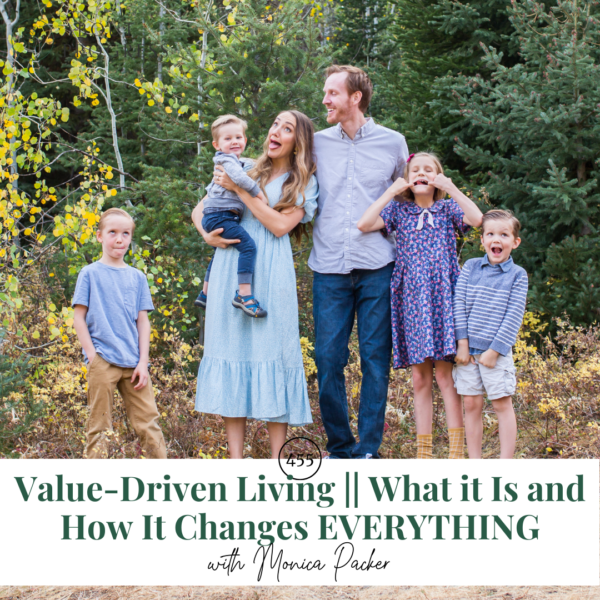
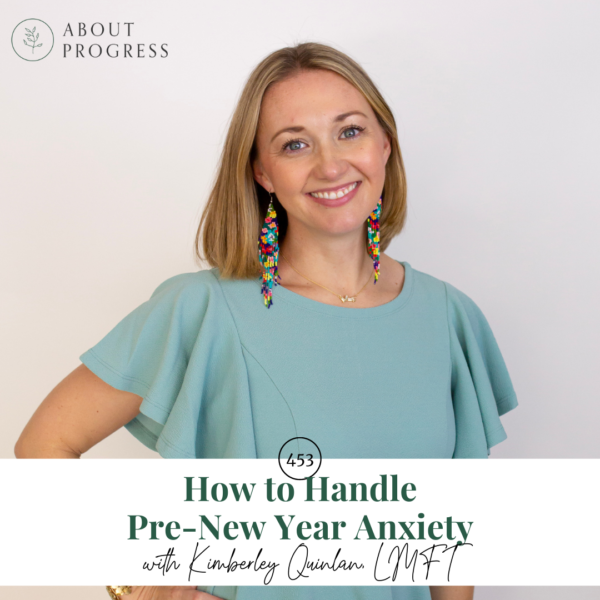


 .
We
.
We





 (again)!!!
(again)!!!

